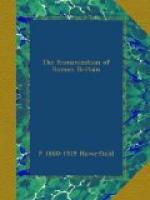[Footnote 4: Professor Vinogradoff, Growth of the Manor (chap. ii), argues strongly for the existence of Celtic land-tenures besides the Roman ‘villa’ system. ’There was room (he suggests) for all sorts of conditions, from almost exact copies of Roman municipal corporations and Italian country-houses to tribal arrangements scarcely coloured by a thin sprinkling of imperial administration’ (p. 83). As will be seen, this is not improbable. But I can find no definite proof of it. If northern Gaul were better known to us, it might provide a decisive analogy. But the Gaulish evidence itself seems at present disputable.]
CHAPTER VII
CHRONOLOGY OF THE ROMANIZATION
From this consideration of the evidence available to illustrate the Romanization of Britain, I pass to the inquiry how far history helps us to trace out the chronology of the process. A few facts and probabilities emerge as guides. Intercourse between south-eastern Britain and the Roman world had already begun before the Roman conquest in A.D. 43. Latin words, as I have said above (p. 24), had begun to appear on the native British coinage, and Arretine pottery had found its way to such places as Foxton in Cambridgeshire, Alchester in Oxfordshire, and Southwark in Surrey.[1] The establishment of a municipium at Verulamium (St. Albans) sometime before A.D. 60, and probably even before A.D. 50,[2] points the same way. The peculiar status of municipium was granted in the early Empire especially to native provincial towns which had become Romanized without official Roman action or settlement of Roman soldiers or citizens, and which had, as it were, merited municipal privileges. It is quite likely that such Romanization had begun at Verulam before the Roman conquest, and formed the justification for the early grant of such privileges. Certainly the whole lowland area, as far west as Exeter and Shrewsbury, and as far north as the Humber, was conquered before Claudius died, and Romanization may have commenced in it at once.
[Footnote 1: Babington, Anc. Cambridgeshire, p. 64; E. Krueger, Westd. Korr.-Blatt, 1904, p. 181; my note, Proc. Soc. Antiq. Lond., xxi. 461 Journal of Roman Studies, i. 146. Mr. H.B. Walters has dealt with the Southwark piece in the Proceedings of the Cambridge Antiq. Society, xii. 107, but with some errors. The Alchester piece may be later than A.D. 43.]
[Footnote 2: The grant is very much more likely to have been made by Claudius than by Nero, and more likely to belong to the earlier than to the later years of Claudius.]




